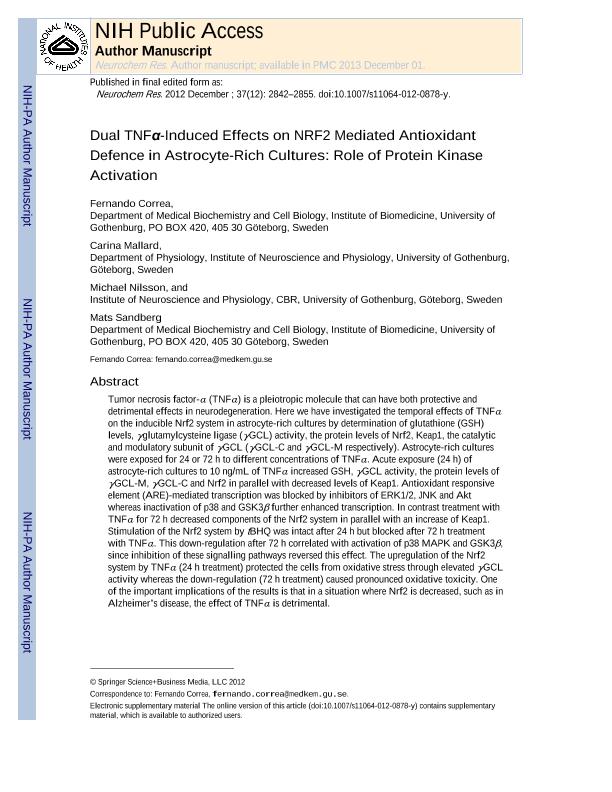Mostrar el registro sencillo del ítem
dc.contributor.author
Correa, Fernando Gabriel

dc.contributor.author
Mallard, Carina
dc.contributor.author
Nilsson, Michael
dc.contributor.author
Sandberg, Mats
dc.date.available
2017-07-11T21:17:17Z
dc.date.issued
2012-12
dc.identifier.citation
Correa, Fernando Gabriel; Mallard, Carina; Nilsson, Michael; Sandberg, Mats; Dual TNFα-induced effects on NRF2 mediated antioxidant defence in astrocyte-rich cultures: role of protein kinase activation; Springer; Neurochemical Research; 37; 12; 12-2012; 2842-2855
dc.identifier.issn
0364-3190
dc.identifier.uri
http://hdl.handle.net/11336/20187
dc.description.abstract
Tumor necrosis factor-α (TNFα) is a pleiotropic molecule that can have both protective and detrimental effects in neurodegeneration. Here we have investigated the temporal effects of TNFα on the inducible Nrf2 system in astrocyte-rich cultures by determination of glutathione (GSH) levels, γglutamylcysteine ligase (γGCL) activity, the protein levels of Nrf2, Keap1, the catalytic and modulatory subunit of γGCL (γGCL-C and γGCL-M respectively). Astrocyte-rich cultures were exposed for 24 or 72 h to different concentrations of TNFα. Acute exposure (24 h) of astrocyte-rich cultures to 10 ng/mL of TNFα increased GSH, γGCL activity, the protein levels of γGCL-M, γGCL-C and Nrf2 in parallel with decreased levels of Keap1. Antioxidant responsive element (ARE)-mediated transcription was blocked by inhibitors of ERK1/2, JNK and Akt whereas inactivation of p38 and GSK3β further enhanced transcription. In contrast treatment with TNFα for 72 h decreased components of the Nrf2 system in parallel with an increase of Keap1. Stimulation of the Nrf2 system by tBHQ was intact after 24 h but blocked after 72 h treatment with TNFα. This down-regulation after 72 h correlated with activation of p38 MAPK and GSK3β, since inhibition of these signalling pathways reversed this effect. The upregulation of the Nrf2 system by TNFα (24 h treatment) protected the cells from oxidative stress through elevated γGCL activity whereas the down-regulation (72 h treatment) caused pronounced oxidative toxicity. One of the important implications of the results is that in a situation where Nrf2 is decreased, such as in Alzheimer’s disease, the effect of TNFα is detrimental.
dc.format
application/pdf
dc.language.iso
eng
dc.publisher
Springer

dc.rights
info:eu-repo/semantics/openAccess
dc.rights.uri
https://creativecommons.org/licenses/by-nc-sa/2.5/ar/
dc.subject
Neuroinflammation
dc.subject
Nrf2
dc.subject
Antioxidant System
dc.subject
Tnfalpha
dc.subject
Glutathione
dc.subject.classification
Neurociencias

dc.subject.classification
Medicina Básica

dc.subject.classification
CIENCIAS MÉDICAS Y DE LA SALUD

dc.title
Dual TNFα-induced effects on NRF2 mediated antioxidant defence in astrocyte-rich cultures: role of protein kinase activation
dc.type
info:eu-repo/semantics/article
dc.type
info:ar-repo/semantics/artículo
dc.type
info:eu-repo/semantics/publishedVersion
dc.date.updated
2017-07-11T19:45:56Z
dc.identifier.eissn
1573-6903
dc.journal.volume
37
dc.journal.number
12
dc.journal.pagination
2842-2855
dc.journal.pais
Estados Unidos

dc.journal.ciudad
Nueva York
dc.description.fil
Fil: Correa, Fernando Gabriel. University Goteborg; Suecia. Consejo Nacional de Investigaciones Científicas y Técnicas; Argentina
dc.description.fil
Fil: Mallard, Carina. University Goteborg; Suecia
dc.description.fil
Fil: Nilsson, Michael. University Goteborg; Suecia
dc.description.fil
Fil: Sandberg, Mats. University Goteborg; Suecia
dc.journal.title
Neurochemical Research

dc.relation.alternativeid
info:eu-repo/semantics/altIdentifier/doi/http://dx.doi.org/10.1007/s11064-012-0878-y
dc.relation.alternativeid
info:eu-repo/semantics/altIdentifier/url/https://link.springer.com/article/10.1007%2Fs11064-012-0878-y
dc.relation.alternativeid
info:eu-repo/semantics/altIdentifier/url/https://www.ncbi.nlm.nih.gov/pmc/articles/PMC3664400/
Archivos asociados
